9/12/2019
Maryland Court Upholds Seat Belt Ticket RoadblocksPolice stopping drivers at intersections to check seatbelt use is not a checkpoint, Maryland Court of Special Appeals ruled.

The use of apparent roadblocks to issue seat belt tickets in Baltimore did not violate the constitution, the Maryland Court of Special Appeals ruled on Monday. A three-judge panel considered the case of Clifton Johnson, who was stopped on May 7, 2016, by members of a team of thirteen Baltimore officers who had set themselves up at the intersection of West Pratt Street and South Payson Street so that they could peer into car windows and ticket anyone not wearing a seat belt.
During the operation, Officer Zachary Serio would walk in the middle of the street to conduct a visual search of the cars. If he saw an unbelted driver, he would issue a command.
"I would advise them to pull off onto Payson Street where there would be another officer who would go forth and write the citation," the officer explained.
Johnson, who was unbelted, did what he was ordered to do. Officer Karl Dauphin was ready and waiting to give him a ticket, but when he looked up Johnson's information, he found out the man had an outstanding arrest warrant. Johnson was taken into custody, and a search of his car uncovered a Smith and Wesson .357 magnum revolver that Johnson could not legally possess.
Johnson's lawyers pointed out that the ticketing operation looked like a roadblock with a large police presence, cars being stopped and cones in the road. Under Supreme Court precedent, however, police must give notice when a checkpoint is in operation, and the operation must be conducted according to strict written guidelines. The operation in question did not give notice or follow guidelines, but the appellate panel insisted that this did not matter because the operation was not a roadblock.
"The hallmark of a checkpoint is that motorists are stopped by the police without the police having a reasonable articulable suspicion to do so," Judge Christopher B. Kehoe wrote for the court. "This was not what happened in the present case."
The officers claimed that they never stopped anyone because they were already stopped by the red light at the intersection. When the light wss green, drivers could continue on -- unless they forgot to put on their seatbelt.
"In this case, Johnson, halted at the traffic light, was driving without a seat belt in clear violation of state traffic laws," Judge Kehoe concluded. "Officer Serio witnessed this violation while walking alongside Johnson's vehicle. This gave the officer sufficient justification to instruct Johnson to pull onto Payson Street so that another officer could issue a citation."
A copy of the ruling is available in a 600k PDF file at the source link below.


